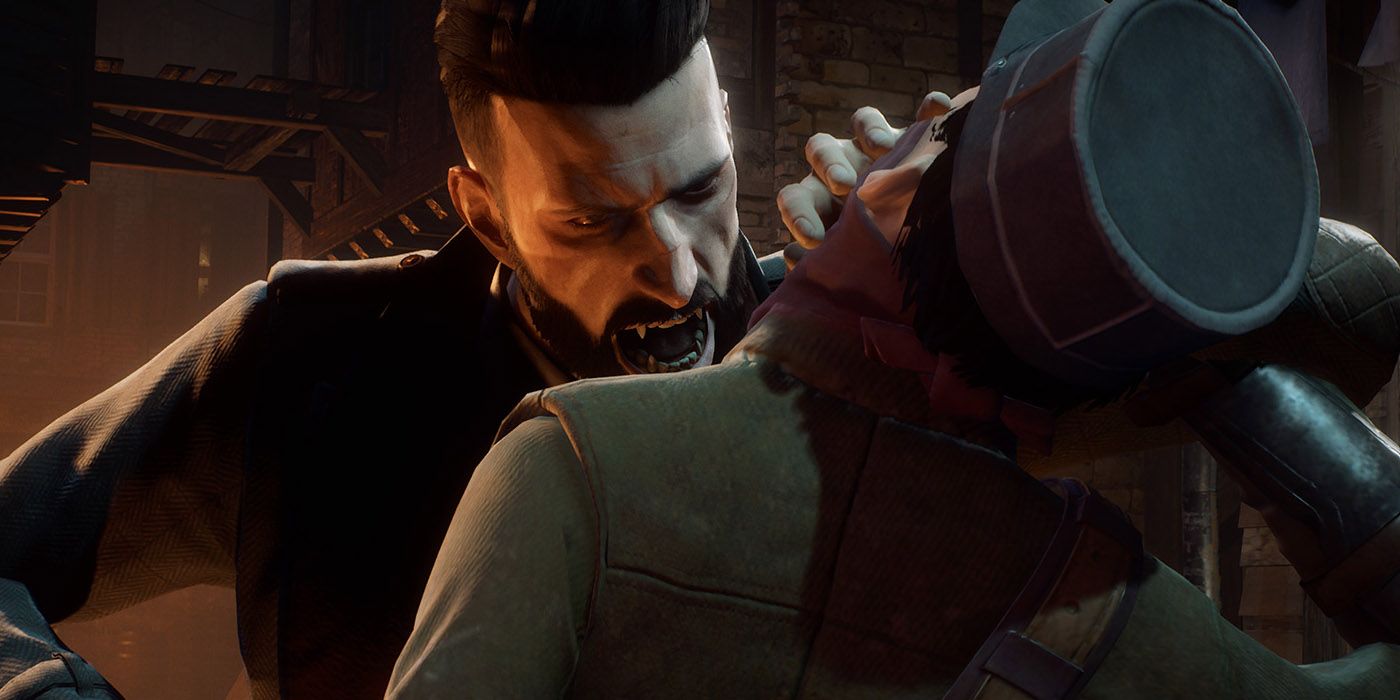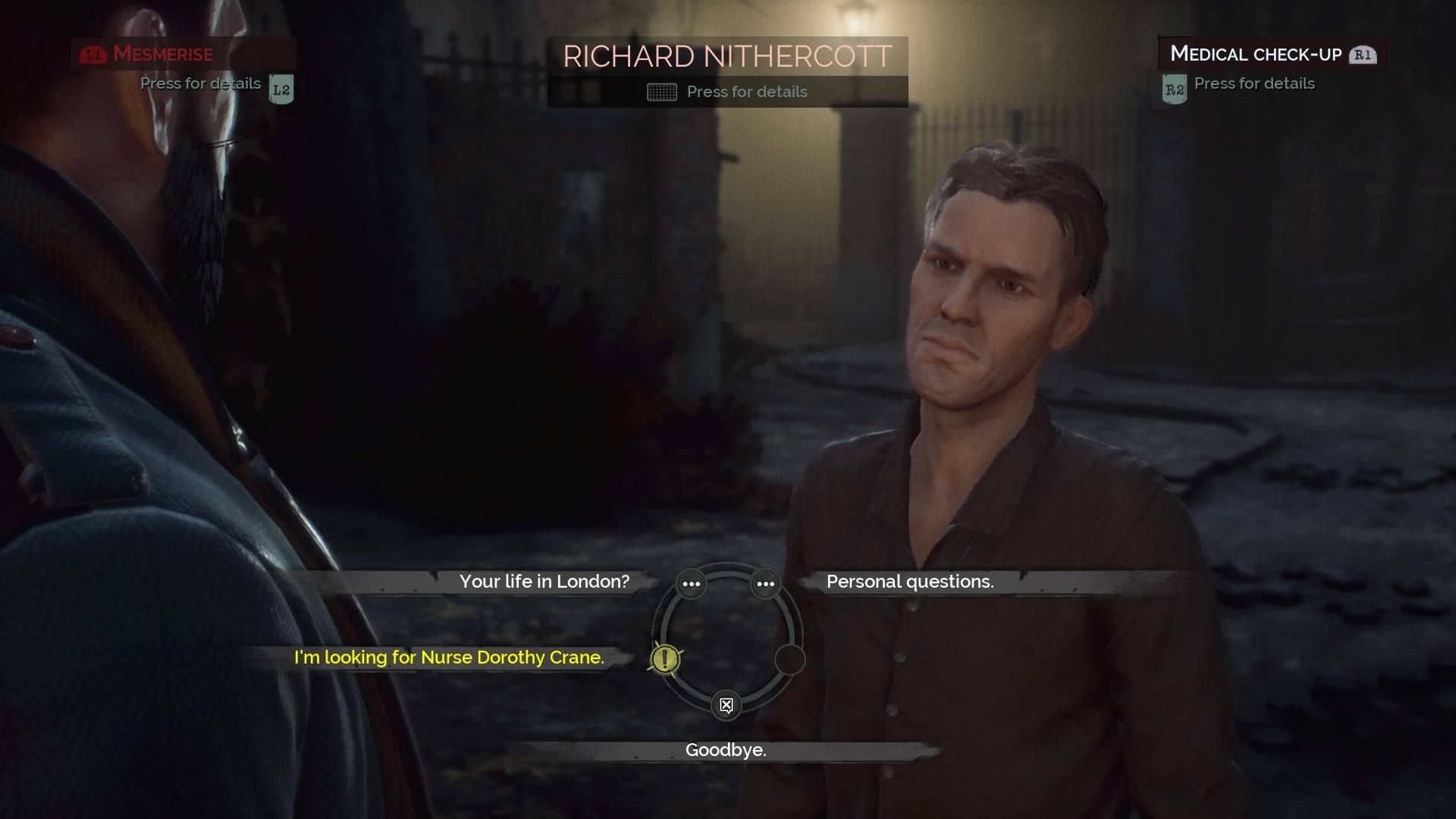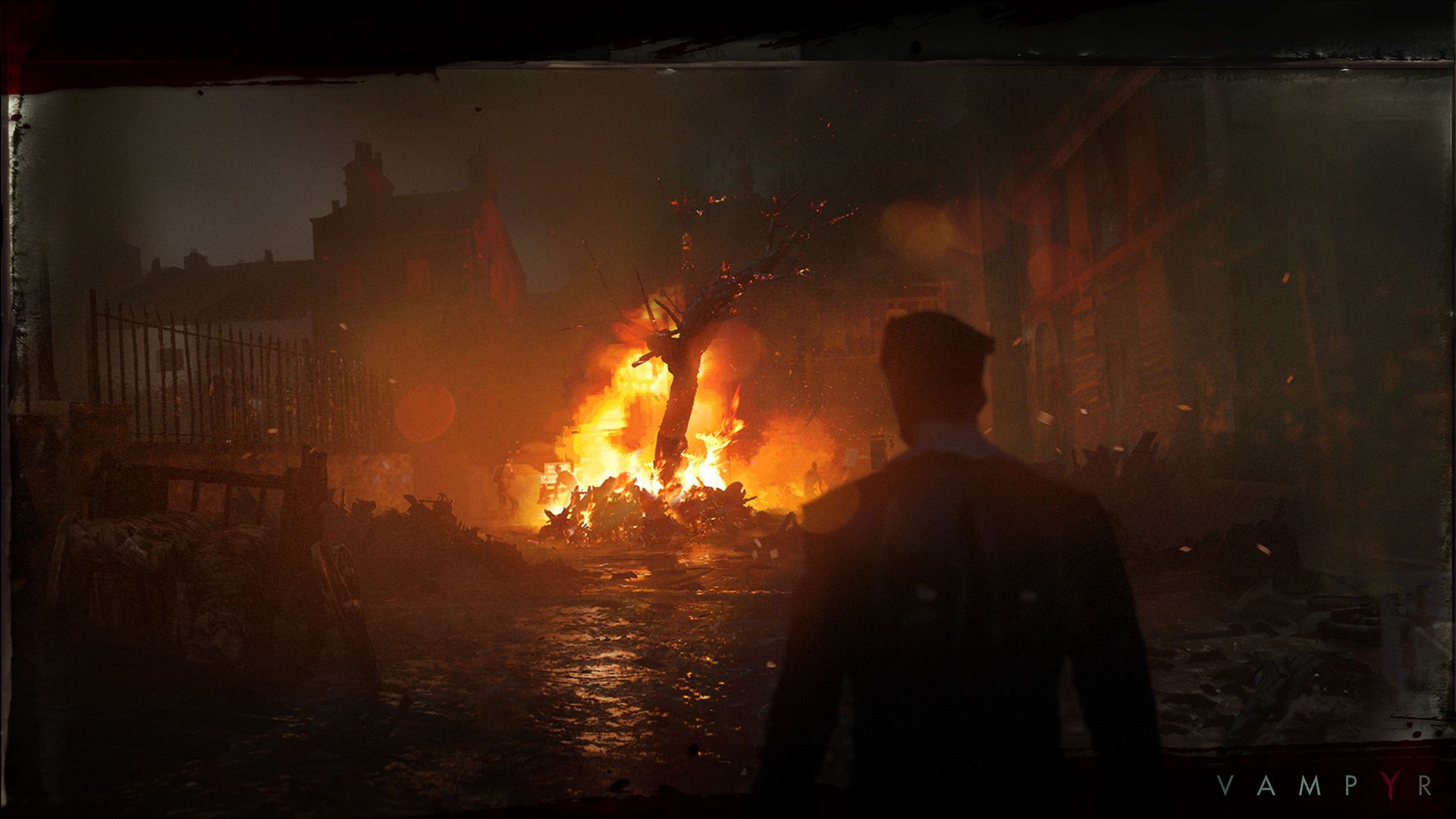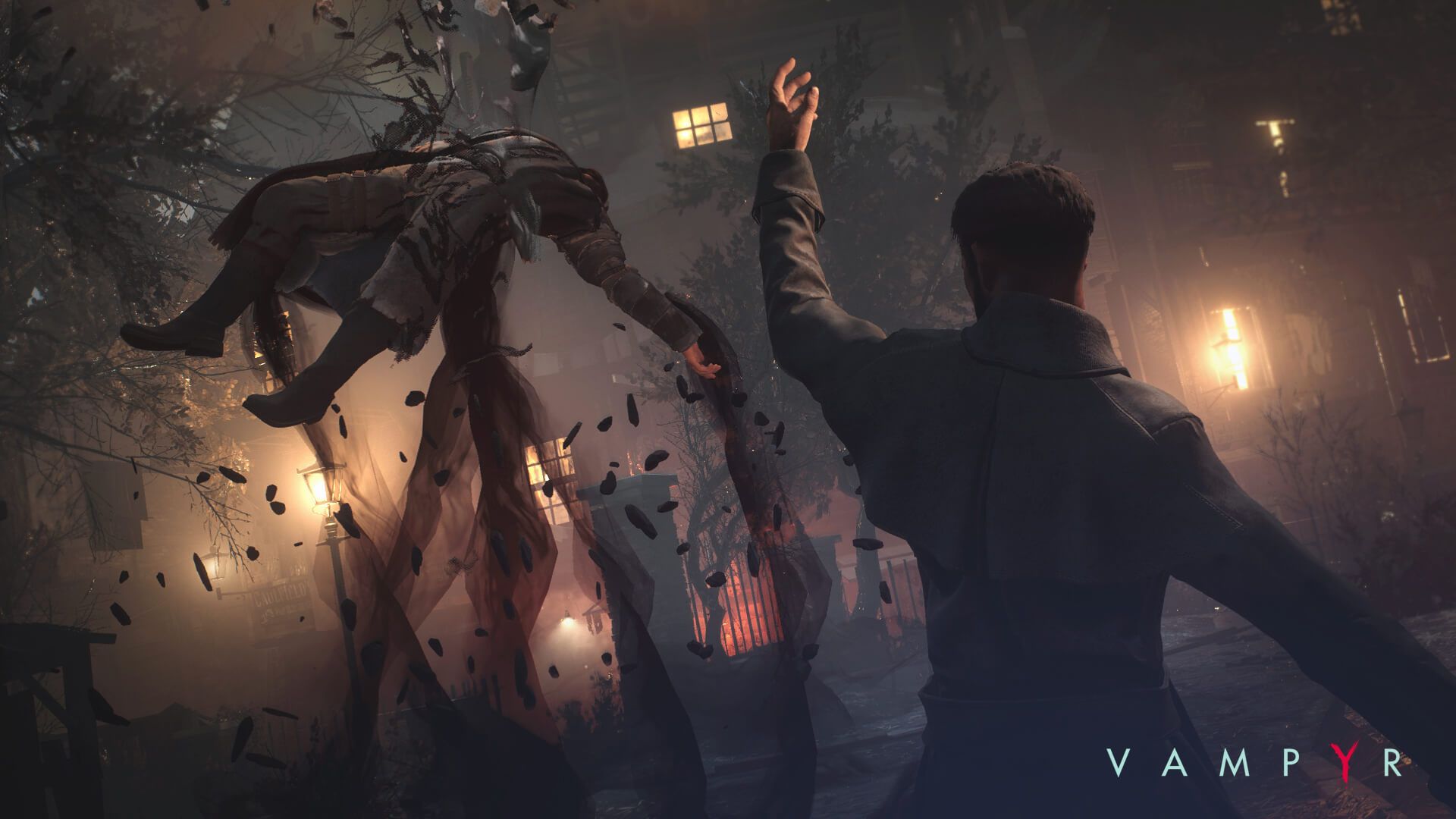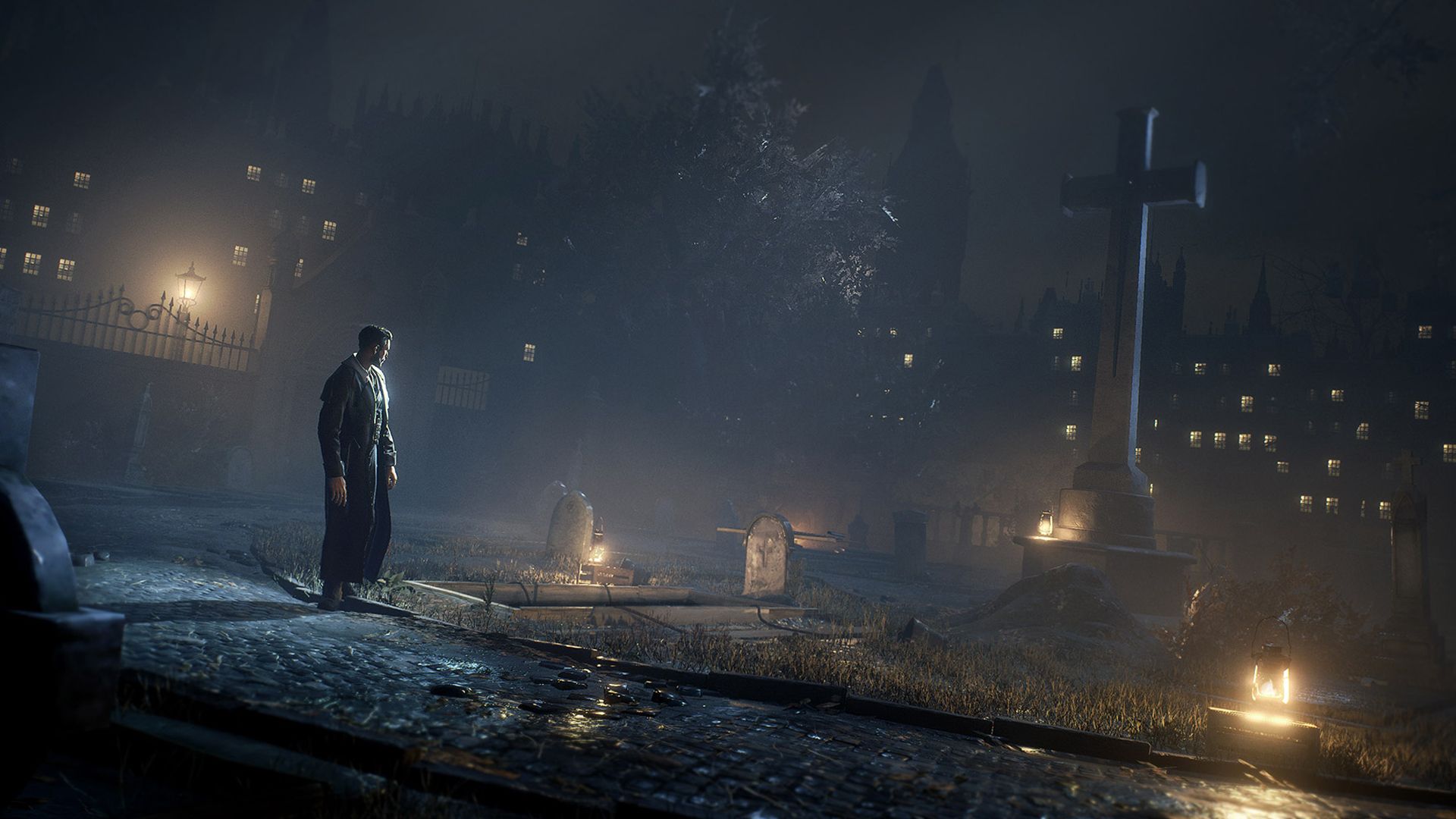Vampyr is an amibious game that allows players to control a newborn vampire, but its fighting and RPG styles often tries to do too much at once.
Dontnod Entertainment has a reputation as a gaming development studio that tries to think outside the box, both with storytelling and gameplay. In 2015's Life Is Strange, the studio created a beautiful title that featured time travel mechanics, as well as characters and a story that resonated with players on an emotional level. Now the studio has released Vampyr, but can the gothic vampire title live up to the same kind of hype?
The answer is yes and no. Vampyr puts players in the shoes of Dr. Jonathan Reid. The game opens with the good doctor waking up in 1918 to a post-war world of black and white, with only small dots of red to show him where life exists. This life, though, is blood, and the doctor soon realizes that blood is the thing he now craves: he has become a vampire. The doctor now needs blood to survive a world that has gone upside down, thanks to Spanish flu epidemic and the aftermath of the first world war. The doctor soon takes his first victim, which brings the world back to vivid color, although that color is muted because the sunlight can never touch his skin again.
As Dr. Reid stumbles through London, he soon learns more about what he has become, especially after he takes on a job at a downtrodden hospital in an area near London's destitute Whitechapel. There, Dr. Reid must decide the fates of every citizen that comes across his path: will they live or die based on his thirst for blood? Meanwhile, there are vampire hunters roaming the streets. Fighting them means requiring strength, a strength that only comes from blood. And the only way to get that blood is by drinking the blood of mortals and killing them.
This is the dilemma posed in Vampyr: although the doctor must work to heal the citizens of the city of London, he must also choose which ones to feed on (if any) to survive. It's an interesting premise, particularly with the RPG part of gameplay. When the doctor is not checking the health of the various citizens of London, he's getting to know them better, by asking questions through dialogue that lets him learn about their hopes and fears. He can also search the streets and buildings of the city to gain clues that unlock additional dialogue choices, some of which helps him on each of his quests.
But exhausting all dialogue choices and unlocking all hints on a citizen does something else: it makes that citizen more delectable, meaning that if the doctor chooses to "embrace" that person, he gains more XP for doing so than he would if he did not know them. XP is what allows the doctor to level up his vampiric abilities by choosing which skills to unlock in what is a rather impressive and varied skill tree. Players can focus on defensive skills, or they can choose to stay on the offensive. There are also skills to regain health. In combat, using these skills requires blood points. Blood points are gained by drinking the blood of people and rats.
This is really where Vampyr excels. Customizing Dr. Reid's abilities really allows players to choose how they want to handle combat. And the combat is easy to pick up, although much of it seems focused on dodging whenever possible and landing blows between hits from the enemy. It also helps that Dr. Reid has the ability to detect certain weaknesses in enemies, and combat is varied enough to prove entertaining.
The problem, though, is that Vampyr doesn't seem to know if it is an RPG or a fighting game. And because Dontnod wanted to focus on both, it means that it feels like the game tries to do too much at any given time. The RPG elements are fine, but the characters seem bland and uninteresting. This is especially true of Dr. Reid himself, and one must wonder how a newborn vampire could be so boring. It's as if the doctor doesn't really even struggle emotionally with what he's become (it is only alluded to), which means that the player really won't feel that connection either. The other characters almost feel like caricatures of 1900s London types and their stories don't really make the player care about them either.
There are some inconsistencies in the way the story plays out: very few of the citizens actually recognize Dr. Reid as a vampire. For all intents and purposes, he looks and behaves just like a mortal. And yet, there are vampire hunters roaming the streets (and they come across much more as thugs than anything) who recognize him as a vampire every single time they see him. And although the game plays up the consequences of killing citizens in the game, killing vampire hunters has no effect on anything whatsoever.
There is also the concept of secret societies floating throughout the story, and it feels like just one more added element that takes away from what's going on with Dr. Reid, as well as the city's epidemic with Spanish flu. It just often feels like there are too many plot points floating around the game at any given time, especially when most of them really don't have much to do with the main story and gameplay.
Gameplay is hard to describe as it is a combination of all of the above: RPG, adventure and hack-and-slash. Dr. Reid must traverse the various zones of London and find citizens to talk to, some who will have information that will help him proceed in achieving missions. Beware, though: some dialogue choices will cause missions to fail, so think carefully before making the choice of what Dr. Reid says next. There is also some adventure-style elements where the player must hunt for supplies and find little hidden pieces of information that will often open up new dialogue options with characters. The fighting element is third person: Dr. Reid can equip a weapon in each hand, unless the player chooses a two-handed weapon. Then the player can choose various attacks, either with weapons or abilities gained throughout gameplay.
On the fighting side, there are also boss fights littered throughout the game that really don't mean anything. There is nothing that ever leads up to these fights, nor is there any real story-driven reason for why they exist. They are also, at times, frustratingly difficult, with enemies that are several levels above Dr. Reid. Players would probably appreciate such challenging fights if that combat actually added to what's going on in the game, but the boss fights really just seem to exist because the developer decided that the game needed to have them.
The game itself, though, looks good. This is a gothic game about vampires, so it's obviously dark and gritty,. Dontnod captured the dirty streets of 1900s London really well: you can almost smell the disease and decay that infects it. The characters are well-rendered and the voice acting is decent, although some of the accents seem off.
Vampyr, though, is an extremely ambitious game from an independent developer who strived to do something different. And in that, it succeeded: Vampyr isn't really like any other title out there. Sure, players won't make any emotional connections to the characters of this game like they did with Life Is Strange. There is also just too much going on for it to feel cohesive. But the game itself, in its novelty, still often proves entertaining. And who doesn't like stepping into the shoes of a creature of the night?
Vampyr is available now on PS4, Xbox One and PC. Screen Rant was provided a PS4 code for this review.

